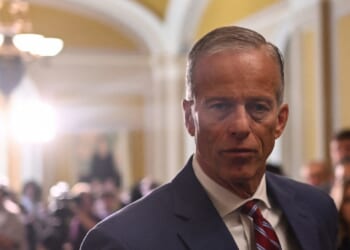It was a brisk Tuesday afternoon when Danny Danon, Israel’s permanent representative to the United Nations, stepped into a Washington, D.C. conference room and fielded questions from reporters ahead of Prime Minister Benjamin Netanyahu’s upcoming third trip to the United States, scheduled for Monday. Danon’s tone? Resolute and impatient with diplomatic euphemism, yet optimistic for the region. His target? Iran — plus the U.N., Hamas, Hezbollah, the Houthis, European trade bureaucrats, and, occasionally, the complacency of the West.
To a question about Israeli intelligence’s assessments of the U.S. strategic bombing of Iranian nuclear sites, Danon said: “We pushed them back. It’s too early to say by how much — whether a year or more — but we pushed them back.” He then added that the media tends to fixate on the nuclear aspect, suggesting that there is a point to be made about how Iran’s aim to ready “thousands of ballistic missiles” was comparable to a nuclear threat. In destroying sites relevant to these missiles, he assures the operation was incredibly successful.
When asked how closely Israel cooperated with the U.S. leading up to the recent strikes, Danon replied: “We speak to our colleagues in DC all the time — before the attack, during the attack, and after the attack. I don’t think we got any commitments that they would join the effort [before Israel’s surprise strike earlier last month]. After we cleaned the area, it made it easier for the U.S. to send the B-2s and finish the job.” Note here that Danon suggests that the U.S. had not made commitments to join the military effort preceding Israel’s first attack, casting doubt on the claims that President Donald Trump’s administration’s initial calls for constraint were just a deception effort.
The ambassador had choice words for Iran’s regional proxies as well. “The Houthis,” he warned, “were not much talked about a few years ago … What happened in Tehran will happen in Yemen.” Israel has “no interest” in tangling with the Yemeni militias, but it would, if forced. “I advise them not to test our resilience.” To a question about whether Israel would push for the US to use its bunker destroyers again, Danon provided no clear answers. Time will tell.
When the subject turned to Gaza, Danon explained how dealing with that issue is far more complicated geopolitically, explaining that many of the European and Gulf actors that condemn Israel in Gaza, celebrate Israeli actions in Iran. “We don’t want to be there,” he said, flatly. “We don’t want to govern Gaza.”
“The challenge is to govern Gaza without Hamas. Even when they are offered to leave — which they shouldn’t, they should die, go to prison — they don’t.”
The ambassador also took aim at the U.N.’s failure to condemn Hamas’s October 7 attacks. “It is shameful,” he said. “The organization was created after the Holocaust … and yet it failed to pass a resolution condemning October 7.”
As for the heavily criticized Gaza Humanitarian Foundation, which some groups claim to be working directly with Israel in pursuit of military efforts, disguised as an aid delivery organization humanitarian aid into Gaza, Danon maintained Israel’s line: “We provide security [for the foundation], we do not control the entire area, we are involved in what happens inside the centers. We support the effort, we cooperate…”
“Some colleagues in the U.N. Security Council are making ridiculous accusations … that GHF is weaponizing narcotics,” Danon continued, referring to accusations that GHF has dissolved opioids in some of the foods they deliver to Gazans.
When Ireland’s recently announced trade restrictions on Israeli settlements and the EU’s general moodiness were brought up, Danon barely contained his exasperation. “The obsession over Israel,” he sighed, “is disturbing.” He did welcome, however, signs that snapback sanctions on Iran may be gaining favor again in Europe.
In a rare moment of optimism, Danon predicted that more nations, including smaller ones, may soon join the Abraham Accords. “For 20 years we couldn’t speak about this,” he said. “Someone wanted to block it [Iran]. They succeeded. But soon, we’ll be right back where we were.” The notion that peace with the Arab world might resume even amid the Gaza war is, for Danon, not a contradiction. It is possible, especially when Iran is factored into the equation.
Prime Minister Netanyahu is expected in Washington next week — a visit that will test the resilience of Israel–U.S. ties following a chaotic month of mixed messaging. Danon hinted at some of what’s on the agenda, including discussions over a ceasefire framework. “We are committed to ending the war and bringing the hostages back,” he said. But the ambassador was blunt about what won’t happen: Israel will not withdraw prematurely, not without hostages, not with Hamas in power. “We cannot move on,” he said. “We’re a peaceful country. But we still have the hostages.”
READ MORE:
Trump’s Iran Strikes Have Important Ramifications









![Florida Man With Violent History Arrested for Choking a Cop [WATCH]](https://www.right2024.com/wp-content/uploads/2025/06/Eleven-Stabbed-in-Attack-at-Salem-Homeless-Shelter-Across-From-350x250.jpg)







